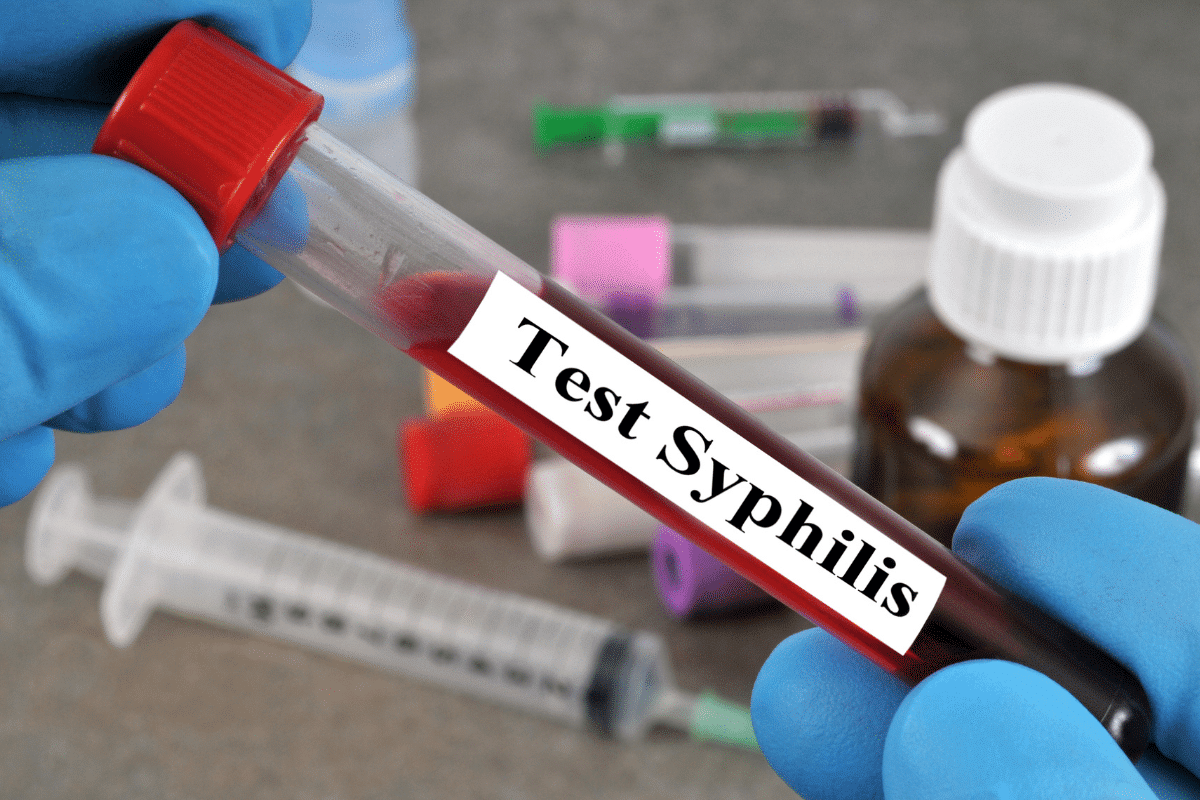What is syphilis?
Syphillis is a bacterial infection typically spread by sexual contact, and particularly during unprotected sex. While syphilis can be easily treated with antibiotics in its early stages, it can harm the body and result in serious complications if left untreated.
There are four stages of syphilis. The first is primary syphilis, which is a stage marked by visible sores (or just one) at a place where the infection first occurred (e.g. the area of the genitals, anus, rectum, in or around the mouth). The second stage is secondary syphilis, which may cause skin rash, inflamed lymph nodes, and a fever. The third stage of syphilis is called latent syphilis in which there are no visible signs or symptoms. The fourth stage is called tertiary syphilis where the bacteria causes complications in various organs such as in the heart and in the brain.

Please bear in mind that, when someone has open sores that are caused by syphilis, the risk of contracting HIV is higher since the virus can easily enter the body through these sores.
How does syphilis spread?
As a sexually transmitted infection, syphilis is spread through direct contact with open sores during vaginal, anal, or oral sex. Some sores may not be easily recognized as they sometimes occur in the vagina or rectum. Syphilis sores can also be found around the penis, on the lips, or in the mouth.
Generally, syphilis spreads through vaginal sex and anal sex. However, there is still a chance of contracting syphilis from giving or receiving oral sex.
How do I find out whether I have syphilis? What are the symptoms?
There are several stages of syphilis infection and symptoms may occur during any of these stages. Please bear in mind that in some cases, syphilis may not cause any symptoms for several years before reaching its final stages. On the other hand, symptoms that generally appear in later stages may possibly happen early because stages can occur in a random order.
Primary syphilis: When you are first infected with syphilis, a small sore will appear at the very spot where the bacteria entered your body for the first time. However, since this sore may appear inside the vagina or the rectum, it is possible that you will not notice it. In addition, since the syphilis sore is usually painless, it is very easy for people to notice the sore.
Secondary syphilis: You may experience a rash in the first few weeks after the first infection. You may also experience sores that look like warts around your mouth and genitals. These symptoms may disappear over time but they can often come and go.
Latent syphilis: If syphilis is left untreated, it will develop into what is called the “latent” stage. At this stage, you may have no symptoms or signs for years after the infection. You will either stay in this stage or move to the next stage known as tertiary syphilis.
Tertiary syphilis: In some cases, people will experience tertiary syphilis if the infection is left untreated. At this stage, the bacteria may cause harm to your brain, your heart, liver, joints, etc.
There are also other types of syphilis namely neurosyphilis and ocular syphilis that may occur when syphilis is left untreated. In these cases, syphilis will spread to the brain and nervous system (neurosyphilis) or to the eye (ocular syphilis). Severe headaches, poor muscle coordination, paralysis, and unresponsiveness are some of the symptoms that may appear.
In some cases, syphilis will not cause any signs or symptoms for years after the first infection takes place. Getting tested regularly will ensure you find out whether you have syphilis as early as possible. By finding out about your status early, you can get treatment before the bacteria causes further complications.

How do I avoid syphilis?
Unfortunately, there is no vaccine for syphilis. In order to avoid getting infected with syphilis, you must follow these steps:
- Use condoms when having sex. While the only sure-fire way of avoiding syphilis or any sexually transmitted disease in general is through abstinence,, prevention is possible through the use of condoms. A dental dam is recommended when performing oral sex in order to avoid syphilis from entering the body through open sores around the mouth.
- Avoid drugs. Mixing drugs with sex may lower your inhibitions and thus make you very vulnerable. Judgments may be impaired under the influence of drugs, leading to risky behaviors..
If I take PrEP for HIV prevention, will it also protect me from syphilis?
PrEP, while effective in preventing HIV, does not protect against other sexually transmitted infections such as syphilis. Condoms remain the best prevention strategy to avoid other infections, including syphilis.
Can syphilis be cured?
Yes, syphilis can be cured if treatment is initiated early. Please understand that the only way to find out whether you have syphilis is by getting tested regularly. A lot of people do not know that they have syphilis at the onset because they do not notice the sores.Share
